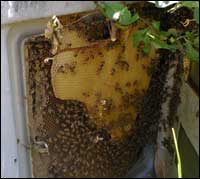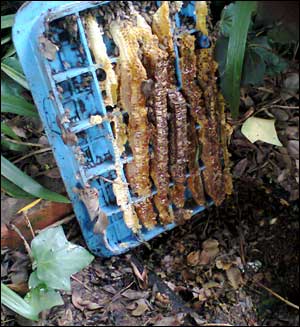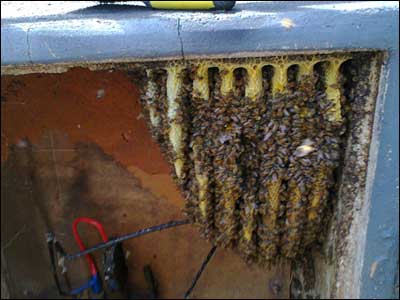 BEE REMOVAL ASSOCIATION OF SOUTH AFRICA
BEE REMOVAL ASSOCIATION OF SOUTH AFRICA

Code of Conduct
Standardisation of conduct of bee removers regarding customer relation's and methods employed for removal will level the field, enabling all bodies to participate freely and equally in the business of bee-keeping.
GENERAL CONDUCT OF REMOVERS:
Permits: Permits are supplied by local government in
terms of National Pest Control act and serve to regulate the keeping of
bees on any premises. Permits should be held by all bee keepers/removers
to prevent contravention of the act.
Safety: Although bees behave in largely predictable ways, they are still not considered tame and could swarm or attack if they feel threatened. Safety of all people and animals in the vicinity should be paramount and potential bee-sting victims should be removed from the area before any removal activity begins.
Insurance: Because of the unpredictable and dangerous nature of the undertaking insurance cover is recommended to all bee removers. Public liability insurance is a good option in this instance. Make sure that your public liability insurance covers bee related incidents.
Training: Training in different methods of bee removal and their application is crucial, both to the success of the removal and to the safety of all concerned.
Behaviour: Behaviour reflects on all members of an organisation and as such a set of guidelines are recommended when performing a bee removal and when dealing with the general public as a bee removal expert.
Acknowledgement: Bees are crucial to the food growing process and should also be regarded as living creatures. Thus we encourage the humane removal of the bees in most situations. Acknowledgement that there are different means of clearing bees, including eradication of a swarm is important.
Fees: Although the charges for bee removal are the prerogative of the bee remover, fees should be relevant to the work done and in taking the ethical approach the task at hand should be completed as per the agreement with the client
How does Biodiversity affect the wellbeing of bees in the city?
Local government in the form of Johannesburg City council are embarking on a sustainability drive focused on the biodiversity of the region. The last convention on biodiversity focused on urban growth in Johannesburg, the impact on the environment and ways in which both the economy and the natural environment can benefit. The focus was on the environment and wildlife sustained in it.
Pollination by bees forms a large part of the food production process and needs to be maintained in order for food production to continue. Often attracted by water and also needing a cool quiet place in which to nest bees find themselves in places like electricity boxes, man holes and occasionally in the vicinity of water inlets and underground water pipes.
It is imperative that these bees are removed alive and re-hived in an
environment suited to them in order for their function at their full capacity.
Bees are dying off by the millions across the globe and this needs to
be reversed before food productions suffers to an even greater degree.
Bees will fall into the category of species and ecosystems of special
concern. A capable bee removal expert will ensure that the bees are removed
intact and re-hived away from the original site and treat the vicinity
to prevent the swarm from returning.
The aim is to maintain a quality urban environment and support a comprehensive conservation network.



.jpg)
Who should participate?
By identifying specific conservation roles and related management plans
local government can make use of the services of bee removal experts located
in the area and use their specialist knowledge in specific conservation
roles and information gathering.
Accountability:
The accountability for urban
growth and sustainability falls with all residents of Johannesburg
and in the hands of developers and the governing departments which are
responsible for impact and feasibility studies.
What is biodiversity and ecological balance?
Bees are indicative of the biodiversity of a region. Whilst many plants
and animals can survive as a single species in an area, it is short lived.
Animals and plants are interdependant on each other for both food and
shelter as well as procreation.
Certain plants will attract specific animals as a food source, allowing
breeding to continue amongst the animals. These animals in turn will ensure
the proliferation of a plant species through seed dropping. What makes
these seeds fertile is the pollination they receive from bees. Continuing
the cycle would then be attraction of predators who would hunt the initial
animals etc. Effectively while there are bees there will be plants and
plants will attract animals and their predators an indication of ecological
balance and biodiversity.
Honey Regulations
There are laws and requlations governing the labeling and contents of food stuffs in South Africa. The bee industry and honey products are no exception.
Click here to read about the labeling requirements that are required for marketing honey.
Our outlook on GMO
What is GMO?
GMO stands for genetically modified organism, a term given to plants and animals that have had their genetic structure modified in an attempt to make them more resilient, and resistant to disease.
This may seem like a good thing, and a cost effective way of protecting plants from being demolished before they can be used for human consumption.
Unfortunately the effect that these modifications have on their natural habitat and the pollinating insects is not advertised. Because the plants are modified to be insect resistant they are often made to be insect killing, and while the benefit may be weevil free corn, it may however result in the death of bees and other such pollinating species, upon which these plants rely.
Bee removals and GMO
While we can't control where bees build their hives or where they go to forage, we can do a lot to ensure that, that which they do forage on is suitable for their and our consumption. That genetic modification, the results of which are often harmful has not taken place.
As bee removers we are intent on preserving the bees. The preservation of the bees is the main reason behind establishing the Bee Removers Association of South Africa. Our code of conduct requires us to remove the bees in a manner that does not harm the colony and to relocate them to a venue where they can continue about their business unharmed.
Usually we will hand off a re-hived swarm to an apiary, as they will have the bees best interests at heart or to a farm where bees are relied on for pollination and their vulnerabilities are understood and respected.